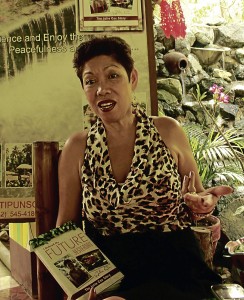The life story of Shoeless Julie

FILIPINO-AMERICAN Julie Cox tells the story of how she survived the twists of fate. MARICAR P. CINCO
Julie Cox isn’t an English movie actress, but hers is a life of plots one could not imagine happening in real life.
In a 159-page autobiography, Cox, a 62-year-old Filipino-American, recounts her story that began from the little-known town of San Antonio in Quezon. A series of unfortunate events started when, she was stricken with severe illnesses as a teenager, was twice raped and got pregnant from the second abuse, and lost her son for 14 years.
“I used to blame God for all the things that happened to me. I asked him why my family had to be poor and why he allowed my father to gamble away our property,” she said.
“But if these did not happen, I would have probably gone back to school and ended up teaching. Not that I didn’t like (teaching) but I wouldn’t probably make it to where I am now, helping and inspiring others,” she said.
Cox was in the Philippines to launch her book, “I Ordered My Future Yesterday.” First published in the United States, it will be released locally this month. Proceeds from the book will be donated to poor families in Quezon.
Barefoot
Cox is the ninth in a brood of 12. Her mother did not have a job, while her father, a carpenter, barely supported the family. “If a burglar had broken into our house, we would have robbed the burglar (instead). That’s how poor we were,” she recalled.
In her book, Cox called herself “shoeless Julie,” like American baseball player “Shoeless Joe” Jackson, only that it wasn’t her intention to walk barefoot to school. She didn’t mind as long as she could attend school, but poverty forced her to work before reaching high school.
Cox was 15 when she worked in a hosiery in Manila. That same year, she was sexually abused, “a skeleton so painful I do not wish to dig up,” she said. She had barely recovered when she was diagnosed with leukemia and hemorrhagic fever.
In exchange for hospital treatment, Cox allowed medical students in Manila to conduct tests on her for months. “I became a grateful guinea pig,” she said.
She eventually regained her health. At 17, she started working as a housekeeper to a Filipino couple in New Jersey through the help of friends. She sent her salary for five years to her brother in Manila for a business they were planning to put up, but the brother squandered it away.
Zambales
“When I came back, a friend of my brother asked me to go out with him. I didn’t know he would take me to Zambales. There, he held me for almost a month, abused and beat me up,” she recalled.
Cox was already pregnant with her son, Armand Joey, when an elderly couple helped her escape. For two years, she scavenged the dump near a naval base to feed her son. They went home to Quezon where she earned from selling “halo-halo” on the street.
“I told God that if he could not make our lives better, he better take me and my son because I was this close to giving up,” she said.
But things did not turn around quickly. Years had passed before Cox met her former employers when they visited the Philippines. They helped her find another employer in the United States and fixed her documents as an immigrant.
Adoption
Not wanting to leave her son behind, she gave up the child for adoption to an American couple in New Jersey, but “they kept him from me for 14 years,” she said.
For years, Cox took odd jobs as a housekeeper and waitress until she found a regular job in a department store. It was there where she met Lou, an American businessman, and married him. Her son, now a successful businessman, sought her out later.
“They say when you’re in the gutter you always have a star to look up to. I hope people will get inspired when they read this book,” she said.
From New Jersey, Cox regularly visits the five-hectare resort she now owns in Barangay Matipunso in San Antonio, and donates school supplies to poor children. On her 60th birthday, she sold her gold jewelry and organized a medical mission.
“I never finished school, but I write from the heart. I don’t think God will mind if my subject and predicate do not agree,” she said.